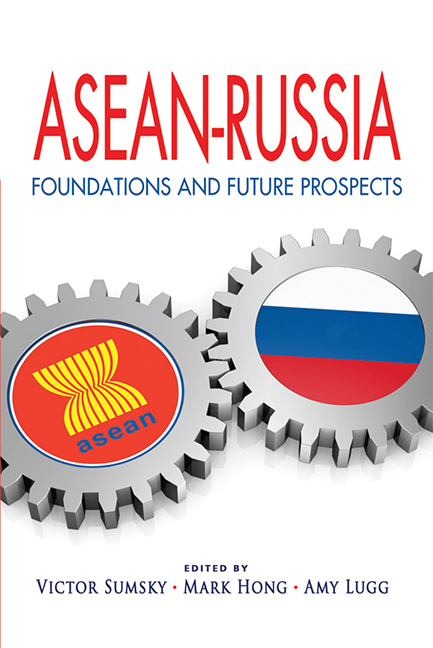Book contents
- Frontmatter
- Contents
- Foreword
- Preface
- About the Contributors
- Keynote Address
- Opening Remarks
- Keynote Address
- Introduction: Russia and the ASEAN Member States: Political and Economic Cooperation in Progress
- SECTION I WISEMEN'S VIEWS
- SECTION II GEOPOLITICS
- SECTION III BILATERAL RELATIONS
- SECTION IV Business and Economics
- Russia and ASEAN-4: Potential and Realms of Cooperation
- Russia's Economic Relations with the APEC Region
- Russia Looks East: Modernization Plans and Cooperation with ASEAN
- Indonesian and Russian Oilmen: Sharing Experiences and Learning from Each Other
- Towards a Roadmap for Russia-ASEAN Trade and Economic Cooperation
- The Best Cities to Buy Into
- SECTION V CULTURE AND EDUCATION
- EPILOGUE
- Index
Towards a Roadmap for Russia-ASEAN Trade and Economic Cooperation
from SECTION IV - Business and Economics
Published online by Cambridge University Press: 21 October 2015
- Frontmatter
- Contents
- Foreword
- Preface
- About the Contributors
- Keynote Address
- Opening Remarks
- Keynote Address
- Introduction: Russia and the ASEAN Member States: Political and Economic Cooperation in Progress
- SECTION I WISEMEN'S VIEWS
- SECTION II GEOPOLITICS
- SECTION III BILATERAL RELATIONS
- SECTION IV Business and Economics
- Russia and ASEAN-4: Potential and Realms of Cooperation
- Russia's Economic Relations with the APEC Region
- Russia Looks East: Modernization Plans and Cooperation with ASEAN
- Indonesian and Russian Oilmen: Sharing Experiences and Learning from Each Other
- Towards a Roadmap for Russia-ASEAN Trade and Economic Cooperation
- The Best Cities to Buy Into
- SECTION V CULTURE AND EDUCATION
- EPILOGUE
- Index
Summary
INTRODUCTION
In 2011 the Association of Southeast Asian Nations (ASEAN) and Russia are commemorating the 15th anniversary of their Dialogue Partnership. Development of cooperation with ASEAN and its member states is one of the priorities of our policy in the Asia-Pacific region. Russia became a fullscale partner in the dialogue with ASEAN in July 1996. Initially, political and security issues dominated the agenda of ASEAN-Russia interactions. But there was much unused potential in the economic sphere. In 2002, in order to promote economic contacts, the Working Group on Trade and Economic Cooperation was established. On 29 November 2004, Russia acceded to the Treaty of Amity and Cooperation in Southeast Asia (TAC). This move created still more prerequisites for a fruitful relationship. At the present time, economic environment in the region is favourable for increasing cooperation. Most Southeast Asian countries are going through industrialization, urbanization, and electrification. Many aspects of these processes are well known to Russia. In fact, we have already developed a substantial material and technical base. During the joint Russia-ASEAN ministerial consultations, it was noted by all ministers for economy that lack of information within business communities about partner countries is the main problem for cooperation between our companies.
SIGNIFICANCE OF THE ASIA-PACIFIC REGION
The Asia-Pacific region has an enormous potential in terms of natural resources, finance, investment, scientific knowledge and technology. During the last twenty years, the nations belonging to this area have been the leaders in economic growth. Today, the world economy is recovering as it gets over the 2008–09 recession. ASEAN countries have made a real contribution to this recovery through their positive growth achievements. The ASEAN economies are not just major exporters of industrial goods and raw materials. Being a key centre of post-crisis economic growth in the Asia-Pacific region, ASEAN is also emerging as a centre of technological development. This is especially important for Russia which is modernizing its national economy.
- Type
- Chapter
- Information
- ASEAN-RussiaFoundations and Future Prospects, pp. 261 - 268Publisher: ISEAS–Yusof Ishak InstitutePrint publication year: 2012



